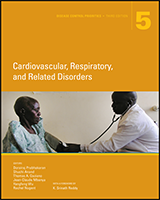Disease Control Priorities, third edition (DCP3) compiles the global health knowledge of institutions and experts from around the world, a task that required the efforts of over 500 individuals, including volume editors, chapter authors, peer reviewers, advisory committee members, and research and staff assistants. For each of these contributions we convey our acknowledgment and appreciation. First and foremost, we would like to thank our 32 volume editors who provided the intellectual vision for their volumes based on years of professional work in their respective fields, and then dedicated long hours to reviewing each chapter, providing leadership and guidance to authors, and framing and writing the summary chapters. We also thank our chapter authors who collectively volunteered their time and expertise to writing over 170 comprehensive, evidence-based chapters.
We owe immense gratitude to the institutional sponsor of this effort: The Bill & Melinda Gates Foundation. The Foundation provided sole financial support of the Disease Control Priorities Network (DCPN). Many thanks to Program Officers Kathy Cahill, Philip Setel, Carol Medlin, Damian Walker and (currently) David Wilson for their thoughtful interactions, guidance, and encouragement over the life of the project. We also wish to thank Jaime Sepúlveda for his longstanding support, including chairing the Advisory Committee for the second edition and, more recently, demonstrating his vision for DCP3 while he was a special advisor to the Gates Foundation. We are also grateful to the University of Washington’s Department of Global Health and successive chairs King Holmes and Judy Wasserheit for providing a home base for the DCP3 Secretariat, which included intellectual collaboration, logistical coordination, and administrative support.
We thank the many contractors and consultants who provided support to specific volumes in the form of economic analytical work, volume coordination, chapter drafting, and meeting organization: the Center for Disease Dynamics, Economics & Policy; Center for Chronic Disease Control; Centre for Global Health Research; Emory University; Evidence to Policy Initiative; Public Health Foundation of India; QURE Healthcare; University of California, San Francisco; University of Waterloo; University of Queensland; and the World Health Organization.
We are tremendously grateful for the wisdom and guidance provided by our advisory committee to the editors. Steered by Chair Anne Mills, the advisory committee ensures quality and intellectual rigor of the highest order for DCP3.
The National Academies of Sciences, Engineering, and Medicine, in collaboration with the Interacademy Medical Panel, coordinated the peer-review process for all DCP3 chapters. Patrick Kelley, Gillian Buckley, Megan Ginivan, Rachel Pittluck, and Tara Mainero managed this effort and provided critical and substantive input.
World Bank Publishing provided exceptional guidance and support throughout the demanding production and design process. We would particularly like to thank Carlos Rossel, Mary Fisk, Nancy Lammers, Rumit Pancholi, Deborah Naylor, and Sherrie Brown for their diligence and expertise. Additionally, we thank Jose de Buerba, Mario Trubiano, Yulia Ivanova, and Chiamaka Osuagwu of the World Bank for providing professional counsel on communications and marketing strategies.
Several U.S. and international institutions contributed to the organization and execution of meetings that supported the preparation and dissemination of DCP3. We would like to express our appreciation to the following institutions:
University of Bergen, consultation on equity (June 2011)
University of California, San Francisco, surgery volume consultations (April 2012, October 2013, February 2014)
Institute of Medicine, first meeting of the Advisory Committee to the Editors (March 2013)
Harvard Global Health Institute, consultation on policy measures to reduce incidence of noncommunicable diseases (July 2013)
National Academy of Medicine, systems strengthening meeting (September 2013)
Center for Disease Dynamics, Economics & Policy (Quality and Uptake meeting, September 2013; reproductive and maternal health volume consultation, November 2013)
National Cancer Institute, cancer consultation (November 2013)
Union for International Cancer Control, cancer consultation (November 2013, December 2014)
Harvard T. H. Chan School of Public Health, economic evaluation consultation (September 2015)
University of California, Berkeley School of Public Health, and Stanford Medical School, occupational and environmental health consultations (December 2015).
Carol Levin provided outstanding governance for cost and cost-effectiveness analysis. Stéphane Verguet added valuable guidance in applying and improving the extended cost-effectiveness analysis method. Elizabeth Brouwer, Kristen Danforth, Nazila Dabestani, Shane Murphy, Zachary Olson, Jinyuan Qi, and David Watkins provided exceptional research assistance and analytic assistance. Brianne Adderley ably managed the budget and project processes, while Jennifer Nguyen, Shamelle Richards, and Jennifer Grasso contributed exceptional project coordination support. The efforts of these individuals were absolutely critical to producing this series, and we are thankful for their commitment.

